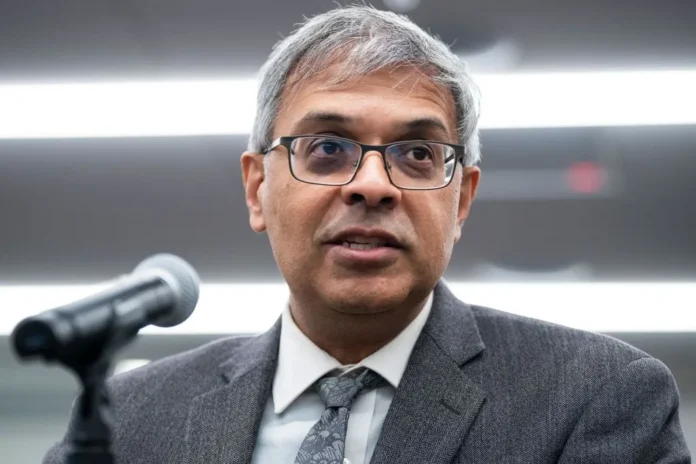The Senate, with a Republican majority starting in January, must confirm the nominee for NIH director.
Stanford-trained physician and economist Jay Bhattacharya has been officially nominated by President-elect Donald Trump to lead the National Institutes of Health (NIH).
Trump announced the nomination on Truth Social, saying, “I am thrilled to nominate Jay Bhattacharya, MD, PhD, to serve as Director of the National Institutes of Health. Dr. Bhattacharya will work with Robert F. Kennedy Jr. to direct the Nation’s Medical Research and make important discoveries that will improve health and save lives.”
This week, Bhattacharya met with Robert F. Kennedy Jr., who Trump has nominated to head the Department of Health and Human Services, which oversees the NIH. According to the Washington Post, Kennedy was impressed with Bhattacharya’s ideas to overhaul the NIH, which is responsible for U.S. biomedical research.
The NIH also awards funding grants to hundreds of thousands of researchers, oversees clinical trials on its Maryland campus, and supports various efforts to develop drugs and therapeutics.
Bhattacharya’s nomination must be confirmed by the Senate, which will have a Republican majority starting in January.
Bhattacharya has called for the NIH to focus more on funding innovative research and reducing the influence of some of its longest-serving officials.
Kennedy Jr. has been instrumental in selecting top health care staff for Trump’s next administration, including Johns Hopkins surgeon Marty Makary, who Trump has chosen to lead the Food and Drug Administration, and former Republican congressman Dave Weldon, who will head the Centers for Disease Control and Prevention.
Bhattacharya and Makary have worked together on a blueprint for a proposed commission to investigate the nation’s coronavirus response.
Trump’s selections of Makary, Weldon, and family and emergency medicine physician Janette Nesheiwat, who has been nominated to serve as surgeon general, also need Senate confirmation.
Bhattacharya was a vocal critic of the federal government’s COVID-19 response during the early days of the pandemic. In October 2020, he co-wrote an open letter calling for the government to roll back pandemic shutdowns but maintain “focused protections” for vulnerable populations, such as the elderly.
This suggestion was supported by Republican lawmakers and many Americans who were critical of shutdowns and wanted to return to pre-pandemic life. However, public health experts, including then-NIH Director Francis S. Collins, criticized the proposal as premature and dangerous amid the spread of COVID-19 when vaccines were not yet available.
Bhattacharya has also called for reducing the power of some of the 27 institutes and centers that make up the NIH, arguing that some career civil servants wrongly shaped national policies during the pandemic and did not allow dissenting perspectives.
He and other critics have also criticized former Director of the National Institute of Allergy and Infectious Diseases Anthony Fauci, who helped shape the nation’s coronavirus response during the Trump and Biden administrations before leaving the federal government in December 2022.
The NIH has been investigated by congressional lawmakers over the pandemic response, with Republicans charging that the agency’s leaders mismanaged the response to the virus and calling for the agency to be overhauled.
Current and former NIH officials, including Fauci, have defended the agency’s response, arguing that federal leaders generally did the best they could to address the virus.







